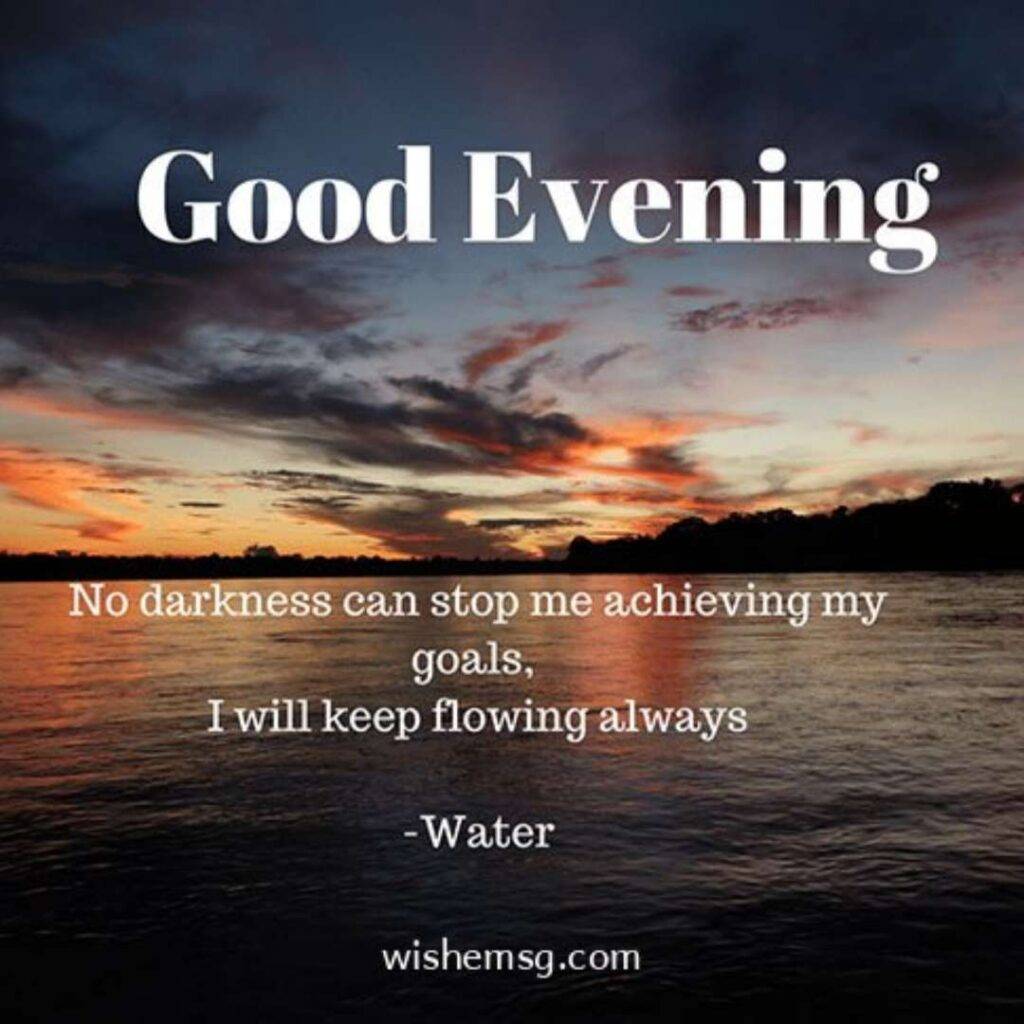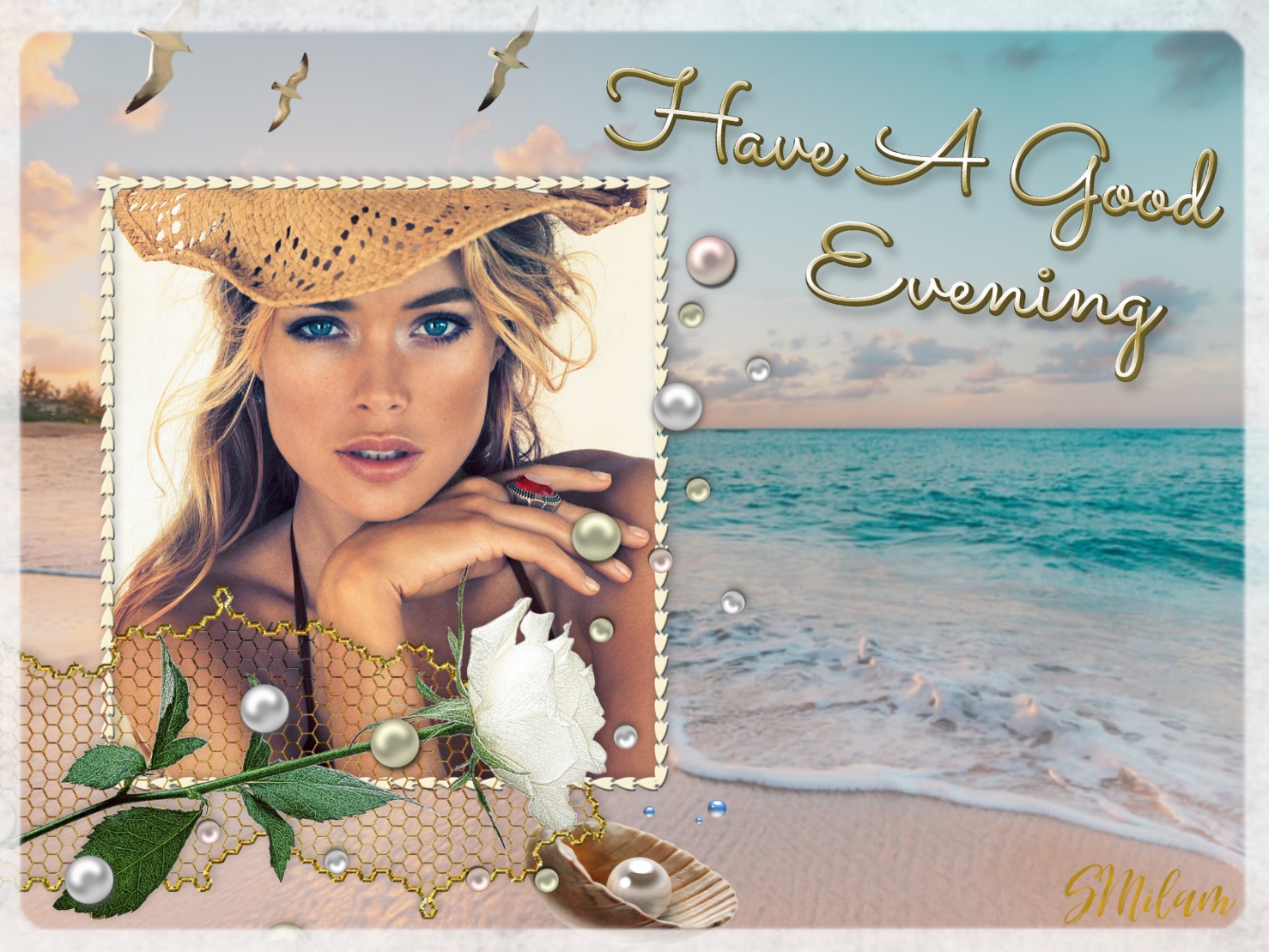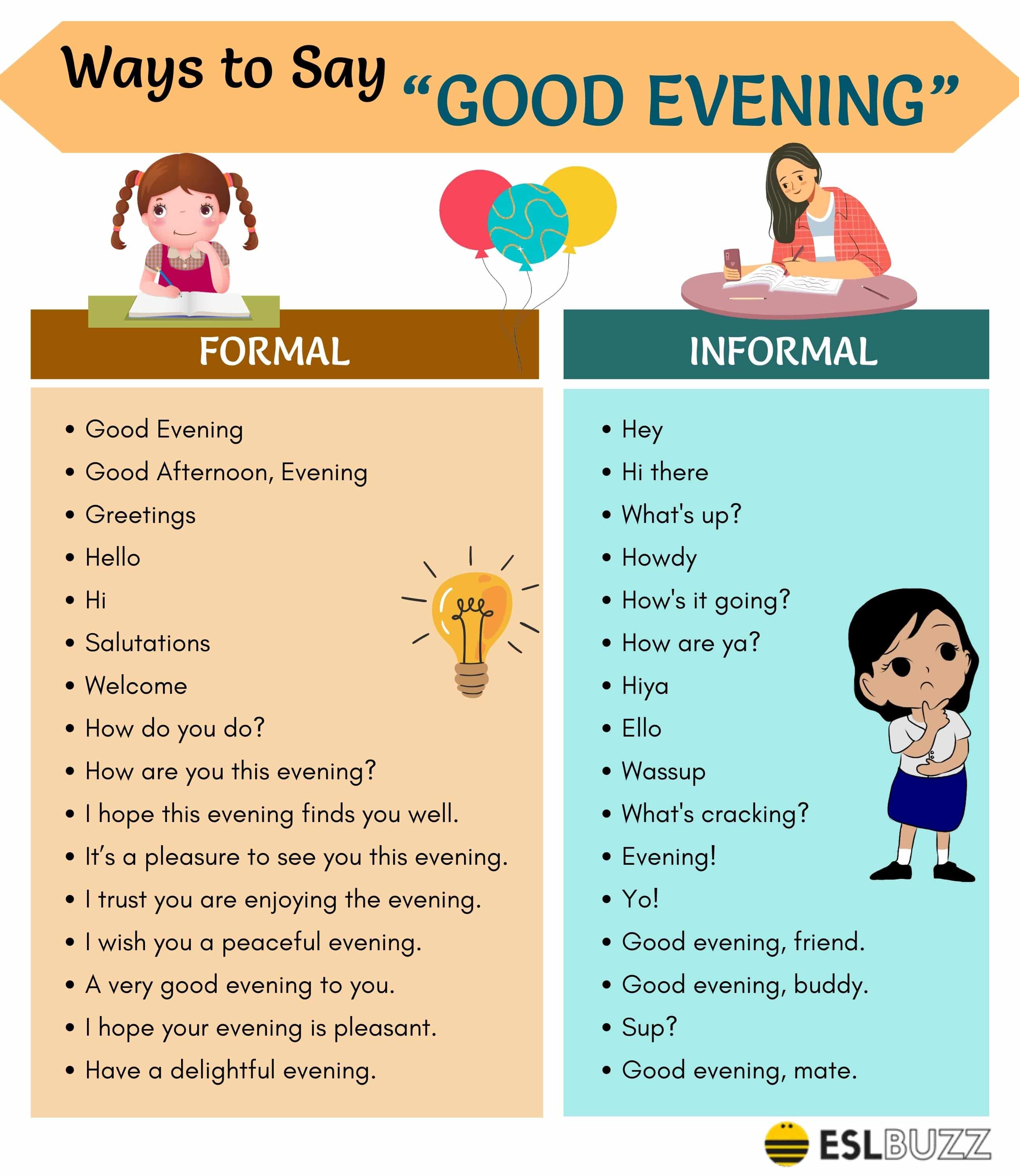Putting a finish to a message, especially an email, can, as a matter of fact, feel a bit like trying to find the perfect last piece for a puzzle. You want to leave a good feeling, a sense of warmth, perhaps even a smile. It's not just about stopping the conversation; it's about making a pleasant exit.
For many, the phrase "have a good evening" is, you know, a common choice when wrapping things up as the day winds down. It's a straightforward, polite way to wish someone well. And, honestly, there's absolutely nothing wrong with it. It gets the message across, simple as that.
Yet, there are, in fact, so many other ways to express that same kind thought, perhaps with a touch more character or a more specific sentiment. Learning to shift your closing words can make your messages feel, you know, a lot more human and connected, whether you're talking to a work colleague or a close friend. We'll look at how to pick just the right words to make your farewells truly count.
Table of Contents
- The Simple Power of a Good Send-Off
- Is "Have a Good Evening" Always the Best Choice?
- When Do You Need Other Ways to Say "Have a Good Evening"?
- Polite Ways to Close Business Messages
- How Can You Make Your Evening Wishes Stand Out?
- What's the Difference - "Good Evening" or "Good Night"?
- Beyond Words - Adding a Little Extra to Your Evening Greetings
The Simple Power of a Good Send-Off
Think about it, a simple phrase at the close of a conversation, or a written message, actually carries a fair bit of weight. It's the last thing someone hears or reads from you for that interaction, so, in a way, it leaves a lasting impression. A well-chosen farewell can make someone feel valued, seen, and appreciated, which, you know, is a pretty good thing to aim for.
It’s a small courtesy, really, but one that can make a big difference in how your interactions are received. Just a little thoughtfulness in your words can, for instance, brighten someone's mood as their workday wraps up. It shows you care about their well-being, even in a small way, and that, too, is a very human touch.
Whether it’s a quick chat in the hallway or a formal email, choosing words that convey genuine good wishes is, as a matter of fact, a skill worth developing. It’s about more than just politeness; it’s about building connections, one friendly goodbye at a time. And, honestly, it doesn't take much effort to get it right.
Is "Have a Good Evening" Always the Best Choice?
While "have a good evening" is, in fact, a perfectly fine and widely accepted way to say goodbye as the day winds down, it's worth considering if it's always the most impactful or fitting option. Sometimes, a phrase that's used so often can, you know, start to lose a bit of its unique feel. It can become a routine sign-off rather than a truly felt wish.
Imagine, for example, you're speaking with someone you've just had a very intense discussion with, or perhaps someone you know quite well. A more specific or personal closing might, you know, land a bit better. It’s like picking out a gift; a generic choice is fine, but something chosen just for them feels much more special. So, in some respects, thinking about your audience and the situation can really help.
There are, you see, times when a slightly different turn of phrase can convey a deeper sense of care or a more specific wish for their upcoming hours. It's about adding a little something extra, a touch of personal consideration that goes beyond the usual. And that, frankly, can make a big difference in how your message is received.
Understanding "Have a Good Evening" in Different Situations
The phrase "have a good evening" holds a certain polite formality, which, you know, makes it a reliable choice for many settings. In a work environment, for instance, it's a courteous way to end a conversation or an email without being overly familiar. It keeps things professional while still showing a friendly spirit. It's pretty much a safe bet for most business dealings, actually.
When you're talking with someone you don't know very well, or in a more formal setting, this particular phrase works quite well. It's a general good wish that, in a way, covers all the bases. It says, "I hope your time after work is pleasant," without getting into too much detail or making assumptions about their plans. So, it's a good go-to for keeping things proper.
However, if you're chatting with a close friend or family member, or perhaps someone you see every day, it might, you know, feel a little stiff. In those cases, you might want something that sounds a bit more relaxed, something that fits the easygoing nature of your relationship. It’s all about matching your words to the feeling you want to create, really.
When Do You Need Other Ways to Say "Have a Good Evening"?
There are, in fact, plenty of moments when switching up your farewell can be a really good idea. Perhaps you've been working on a big project with someone, and you want to acknowledge their hard work directly. Or maybe you know they have a specific event planned for later. In these situations, a more tailored closing can feel much more genuine and thoughtful, you know?
Consider, for instance, when you're wrapping up a call with a client who's just had a challenging day. Instead of just "have a good evening," you might say, "I hope you can find some quiet time to relax." This shows you've been listening and that you care about their well-being beyond the immediate task. It’s a small shift, but it carries a lot more feeling, really.
Also, if you're trying to build a stronger connection with someone, or simply want to add a bit of variety to your messages, having a range of closings at your fingertips is, quite honestly, pretty useful. It keeps your communication from feeling too repetitive and, in a way, shows a bit more personality. So, it's about being prepared for different kinds of interactions.
Polite Ways to Close Business Messages
Ending a business message with courtesy and a bit of warmth can, you know, leave a really positive feeling. It's about showing respect for the other person's time and their day, even as you conclude your communication. This can be done in many ways, some of which are a little more formal, others a bit more relaxed, but all aiming for a good impression.
For example, instead of just the usual, you could try phrases like "Enjoy your evening" if you want to sound a touch more inviting, or "Hope you have a peaceful evening" if you know they've had a busy day. These alternatives, you see, still maintain a professional tone while adding a layer of personal consideration. They show you're thinking about their well-being, which is, honestly, a nice touch.
Another option, especially if you expect to talk again soon, is something like "Talk to you tomorrow" or "See you in the morning." This keeps the connection going and feels, you know, very direct and efficient. The key is to pick a phrase that fits the situation and the person you're speaking with, making sure it feels natural and not forced. It’s about making a good exit, really.
Making Your Farewells More Personal
Adding a personal touch to your goodbyes can, in fact, make a big difference in how your messages are received. It shows that you've put a little extra thought into your words, rather than just using a standard phrase. This can be as simple as acknowledging something specific about their day or their plans, which, you know, makes the message feel much more tailored.
For instance, if you know someone is heading to a concert, you might say, "Hope you enjoy the music this evening!" Or if they mentioned a challenging task, "Wishing you a smooth evening after all that hard work." These small additions, you see, demonstrate that you're paying attention and that you care about their experiences beyond the immediate conversation. It’s a very human way to connect.
The goal is to make your closing feel less like a formality and more like a genuine wish. This means choosing words that resonate with the person and the context, making your farewells feel, you know, authentic. It’s about creating a warm feeling, a sense of connection that lingers after the message is sent. And, honestly, it's pretty easy to do once you get the hang of it.
How Can You Make Your Evening Wishes Stand Out?
To make your evening wishes truly memorable, you might, for instance, think about the specific vibe you want to create. Do you want to inspire, bring a smile, or simply offer a moment of quiet calm? The words you choose can, you know, really shape that feeling. It's about being intentional with your message, even for something as simple as a goodbye.
For a touch of warmth, consider phrases like "Wishing you a lovely evening" or "Hope your evening is filled with good things." These are, in a way, a bit more descriptive than just "good," and they convey a sense of genuine care. They invite the person to picture a pleasant time ahead, which, honestly, is a nice thought to send someone's way.
If you're on social media, for example, sharing a thoughtful "good evening" message can be a simple way to connect with friends and followers. You could offer a quote that encourages rest, or a lighthearted thought that brings a little joy. It's about using your words to spread a little positive energy as the day comes to a close, which, you know, is a really good thing to do.
What's the Difference - "Good Evening" or "Good Night"?
This is, actually, a question that comes up quite often, and it's pretty simple once you get the idea. "Have a good evening" is generally used as a greeting or a farewell during the evening hours, meaning the time after late afternoon and before bedtime. It's a wish for someone to have a pleasant time during that period, whether they're working, relaxing, or doing something else, you know?
On the other hand, "good night" is almost always used as a farewell when someone is going to bed or when you're parting ways for the rest of the night. It carries the specific meaning of wishing someone a restful sleep or a peaceful end to their day before they retire. So, you wouldn't typically say "good night" to someone you're just starting an evening meeting with, for instance.
There's a subtle but important distinction, then. "Have a good evening" is about the hours that are still active, while "good night" is about the transition to rest. It's like the difference between wishing someone a good day and wishing them sweet dreams. Knowing when to use each one can, you know, make your communication sound a lot more natural and correct.
Beyond Words - Adding a Little Extra to Your Evening Greetings
Sometimes, words alone, you know, aren't the only way to convey a warm evening wish. In our very visual world, adding a small graphic or a short animated clip can actually bring a lot more personality to your message. It's a way to add a bit of fun or a comforting visual to your farewells, especially in less formal settings.
For example, if you're texting a friend, a simple animated image that says "have a good evening" with a calming sunset or a cozy scene can, you know, make the message feel much more friendly and lighthearted. It’s a quick way to add a little extra something without writing a lot of words. This can be pretty effective for personal messages, actually.
Even a well-chosen image can, in fact, speak volumes. Think of a picture of a quiet, inviting scene as the sun sets, paired with a simple "Enjoy your evening." These visual cues can, in a way, create a stronger emotional connection and make your goodbyes feel more memorable. It’s about using all the tools at your disposal to make your message land just right.
In wrapping things up, we've explored how a simple phrase like "have a good evening" is a solid start, but there are many ways to make your farewells more personal and impactful. From understanding the subtle differences between "good evening" and "good night" to choosing phrases that fit formal or casual settings, and even adding a visual touch, the goal is always to leave a positive feeling. By varying your language and thinking about the person you're addressing, you can make every goodbye a little more thoughtful and genuinely warm.
Related Resources:



Detail Author:
- Name : Colten Kiehn V
- Username : mosciski.sage
- Email : cgrady@gmail.com
- Birthdate : 1997-09-28
- Address : 9743 Gayle Canyon Apt. 475 Lake Laron, LA 31206
- Phone : +1-878-300-9002
- Company : Anderson Ltd
- Job : Distribution Manager
- Bio : Exercitationem ut fugiat animi. Excepturi ut tempora sint enim. Hic illum sed eius alias. Velit et sit voluptates ut. Reiciendis est accusamus repellat iusto iste.
Socials
twitter:
- url : https://twitter.com/padbergj
- username : padbergj
- bio : Sed cum facilis quaerat autem quae voluptas nam. Vel temporibus et consequatur vel non perferendis nam a. Rerum recusandae veniam dolorum omnis.
- followers : 3714
- following : 1174
facebook:
- url : https://facebook.com/javonte_id
- username : javonte_id
- bio : Maiores ducimus et vel et sint.
- followers : 1805
- following : 701